
Healthy Heart: Become Your Heart’s Own Savior
A healthy heart is integral to generally great well-being. Accepting a healthy way of life at whatever stage in life can hinder the scope for heart illness and lower your danger for cardiovascular failure or stroke. You are never excessively old or too youthful to even think about starting to deal with your heart. Valid, the younger you start settling on sound decisions, the more you can receive the rewards. Yet, accepting healthy routines for advance great well-being can affect, regardless of whether you've as of now experienced a coronary disease or medical issues in the past.
Whatever your motivation, realize that the advantages of a healthy heart will be worth the work. Truth to be told, your whole body will derive immense benefits from this. Great well-being can likewise shield you from type 2 diabetes, asthma, arthritis, and other chronic infections. It can even lower your danger of any other diseases. Furthermore, a sound way of life that incorporates eating quality healthy heart food sources and getting routine exercise has been demonstrated to support your overall health.
Causes for bad heart health
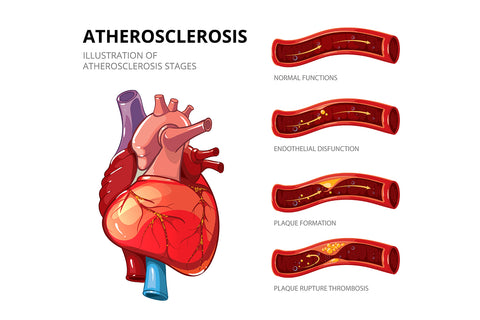
Cardiovascular diseases have high rates of mortality, morbidity, and disability, which are the leading causes of human death irrespective of age, race, and region. According to the World Heart Federation, one-third of adults over 25 suffer from cardiovascular diseases globally.
Some of the common causes that lead a person to experience Heart-related illness:
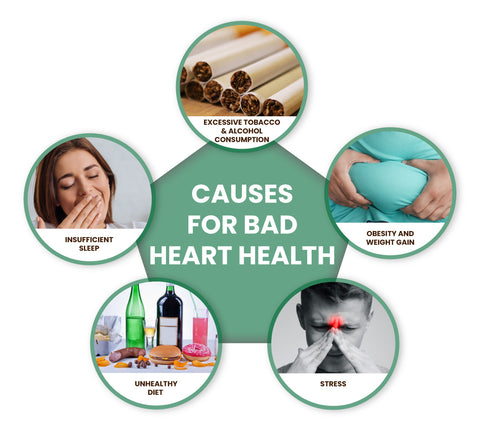
-
Excessive Tobacco & Alcohol Consumption
Both tobacco and liquor can lay destructive impacts on the heart. It can also injure the arteries by making the bad cholesterol stick to the arteries(which supplies blood and oxygen to the heart) that cause narrowing & blockages in the heart.
At the same time, heavy drinking might well build the danger of cardiovascular failure, cardiovascular breakdown, stroke, and hypertension. Smoking is likewise regular among liquor consumers. The medical heart issues related to excessive smoking and drinking are broad.
-
Obesity and Weight Gain
Obesity and overweight are connected to a few factors that increase the danger for cardiovascular disease that is coronary artery disease and stroke:
- High blood lipids, increase LDL cholesterol, and low HDL cholesterol
- Hypertension or high blood pressure
- Type-2 diabetes Mellitus
Obesity is a chronic metabolic disorder associated with cardiovascular disease and increased morbidity and mortality. A variety of alterations in cardiac structure and function occur as excess adipose tissue accumulates. It is one of the significant reasons for the prevalence of cardiovascular risk factors, including type 2 diabetes, hypertension, and sleep disorders.
-
Stress
Stress can expand trouble in your body, which is thus connected to factors that can hurt your heart. However, constant stress can likewise influence or impact your heart more inappropriately. When ins stress, the body releases a hormone called ‘cortisol.’ Some profound researchers show that increased cortisol levels from long-term stress increase blood cholesterol, blood sugar, triglycerides, and blood pressure.
At the point when you're in a stressful state of mind, you will, in general, rest inadequately. Likewise, you're more concerned about working out, settling on quality food decisions, or watching your weight. These ways in life changes can put your heart's well-being in danger. A person in stress or depression is more likely to hamper their heart health and may face severe cardiovascular impacts.
-
Unhealthy Diet
Foods high in sugars, saturated and trans fats, low fiber foods and high-sugar drinks, processed food contribute to non-communicable diseases (NCDs) and other health problems such as high blood pressure, high blood glucose, overweight, obesity, and high cholesterol. Consuming high-trans fat and saturated food sources will make more fatty plaques develop in your arteries, which can impact your heart- well-being drastically.
There are likewise two kinds of fat ‘saturated and unsaturated. Stay away from food varieties containing significant degrees of trans fat, as they increase low-density lipoprotein (LDL) cholesterol levels in your blood, also known as ‘bad cholesterol.
-
Insufficient Sleep
Considerable proof proves that lack of sleep affects heart well-being. Sleep is real-time for the body to revive. During the non-fast eye development (NREM) sleep stages, pulse eases back, circulatory strain drops, and breathing balances out. These progressions lower the heart’s weight, permitting it to recover from strains that happen during waking hours.
Without adequate daily sleep, an individual doesn't invest sufficient energy in the intense phases of NREM sleep that advantage the heart. Subsequently, constant sleep deprivation is connected to heart problems, including hypertension, elevated cholesterol, coronary failure, obesity, diabetes, and stroke.
Consequences
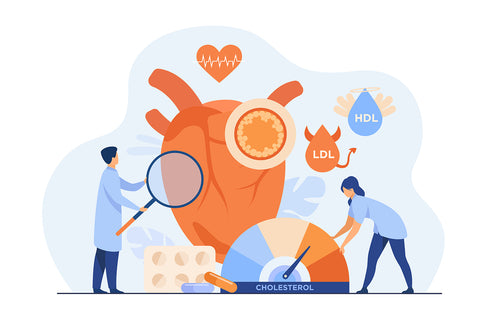
There are several serious health consequences that poor heart health can lead you to, such as:
Prevention
You are in direct command over numerous things that can impact your heart's wellbeing. It is not that difficult to embrace a sound way of life. It is a matter of adopting a healthy lifestyle cycle, and your heart is good to go.
Many reliable ways can ensure your prevention from any cardiovascular disease and also enhance your healthy heart:
-
Regular Exercise

Exercise can influence the cardiovascular health and reduce the risk of cardiovascular diseases. It has many positive effects on heart well-being. A regular exercise routine can help lower blood pressure, reduce the risk of developing diabetes, help maintain healthy body weight, and lowers inflammation throughout the body. It can also help you quit smoking or alcohol consumption and take you towards a beneficial life habit. Start with the aim of doing exercise for 30-40 minutes every day.
-
Heart-Healthy Foods

Some food varieties can help with your heart’s wellness. They can also be called heart-healthy foods. Consuming a significant amount of food good for the heart can increase the body’s ability to fight heart diseases and prosper its well-being.
Some of the heart-healthy foods that work excellently for the better functioning of your heart are:
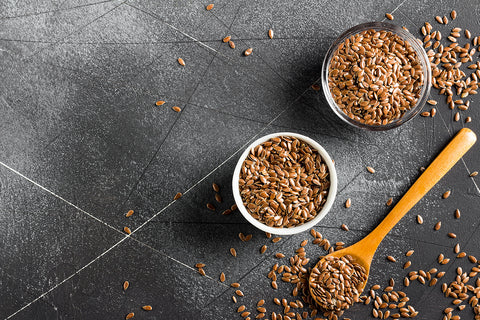
Flaxseeds are rich in polyunsaturated fatty acids, particularly ALA α-Linolenic Acid, the essential omega-3 fatty acid & linoleic acid(LA), the essential omega-6 fatty acids. These two fatty acids are vital for reducing total plasma cholesterol.
It is an extremely rich heart-healthy food as:
- Flax fibers contain both soluble and insoluble dietary fibers. The significant insoluble fiber fraction consists of cellulose and lignin, and the soluble fiber fractions are the mucilage gums. Dietary fiber acts as a bulking agent in the gut. It helps control appetite, blood glucose, promotes laxation, and reduces blood lipids.
- Vitamin E is present abundantly in flaxseeds. It promotes sodium excretion in the urine and helps lower blood pressure, thus reducing the risk of Heart Disease.
Magic use of Flaxseeds: Add a healthy spoon of flaxseed to your hot or cold breakfast cereal and your other favorite food varieties like yogurt, oatmeal, cereal, smoothies, and baked foods.

Apple cider vinegar with ‘The Mother’ is unfiltered and unrefined as it contains healthy bacteria. ACV decreases triglycerides and very-low-density lipoprotein (VLDL) cholesterol. It can also work as an adequate heart-healthy food for your heart as:
- Increases Breakdown of Fat
- Boosts Metabolism
- Enhances energy uses and increases satiety.
- Lowers high blood pressure
- Reduces bad cholesterol
- Reduces belly fat hence promotes weight management.
- Aids in fighting fungal & bacterial infections.
Magic use of ACV: Try mixing the ACV with other liquids, such as fruit juice, tea, or apple cider, for a different healthy and tasty flavor.

Amla is one the richest source of Vitamin-C minerals (Zinc & Copper). It is a good Cardio Tonic, and its mild stimulant action on the heart helps control blood pressure. It helps strengthen the heart muscles and causes a significant decrease in total cholesterol, LDL cholesterol, VLDL cholesterol, and triglycerides. It also helps to boost metabolism, thus preventing the accumulation of fat.
Regular consumption of amla nurtures the heart, improves blood circulation, and aids the overall cardiovascular system.
Magic use of Amla: 1tsp (5gm) of dried Amla powder can be added to your daily routine in vegetable juices, soups, and salad dressing.
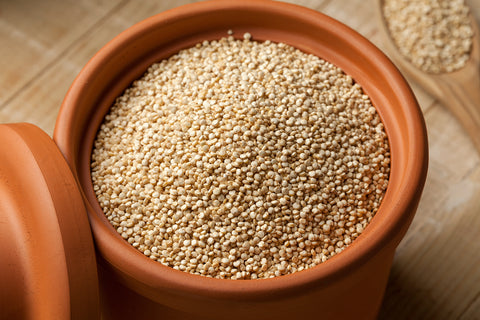
Quinoa is one of the excellent healthy heart-food. Quinoa grains have superior nutritional food quality and are also called the mother grain. Quinoa has high protein concentrations, essential amino acids, unsaturated fatty acids, and a low glycemic index (GI). It also contains vitamins, minerals, and other beneficial compounds and is gluten-free by nature.
Magic use of Quinoa: Prepare a healthy quinoa Upma and enjoy the most nutritious and tastiest breakfast.
-
Weight Management

Maintaining a sound weight is significant for the heart’s well-being. As well as bringing down the danger of coronary illness, stroke, diabetes, and hypertension, it can likewise bring down the threat of various diseases. Being in good shape enhances one’s personality and helps adopt healthy habits that create a healthy lifestyle cycle.
-
Say No to Tobacco & Alcohol

Restricting tobacco & alcohol in your life can become the best decision for your heart’s wellbeing. Not only heart but saying a strict no to cigarettes, alcohol, and other harmful drugs can prosper your overall well-being. Being healthy limits the risks of both smoking and drinking may altogether work on your lifestyle prosperity.
-
Sound Sleep

Great quality sleep lowers the work of your heart, as pulse and heart rate go down around at the sleeping time. Following a healthy workout regime, a healthy diet, engaging in stress-buster activities, or many more techniques could help achieve a good sleep.
Conclusion
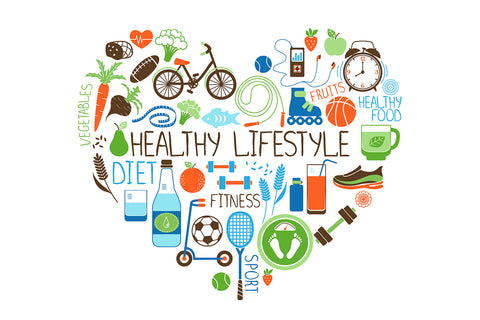
Incorporating these healthy habits in your life must bring the best outcomes from your heart’s well-being. As it is said, ‘if the heart’s happy, health’s happier.’ Everything goes around what you eat and how you manage your daily- lifestyle. Eating food good for the heart and saying bye to unhealthy habits is the way to your healthy heart. Adopting healthy habits always leads you to flourishing outcomes for your healthy heart and overall well-being.
FAQ
-
Is all cholesterol bad?
No, not all cholesterol is bad. Cholesterol plays a very important role for the body, like the production of hormones and building cells. However, High levels of LDL(Low-density Lipoproteins) are associated with heart diseases risk, whereas high levels of HDL(High-density Lipoproteins) work as a protector of your heart.
-
Can’t cholesterol levels go down once they get high?
Cholesterol levels can go down if one consumes heart-healthy foods - low in saturated & trans fat, rich in fiber & low in simple sugars. Also, following a healthy exercise regime, avoid the intake of tobacco and alcohol can help.
-
Are there any side effects of stopping the consumption of oil?
Yes, there can be some significant drawbacks and side effects of removing oils from your diet completely. There are both good and bad fats. We can’t completely stop their consumption, or it may lead to many adverse effects such as hollowing of cheeks, extreme weakness, balding, vitamin & mineral deficiencies, and many more.
-
What are good fats?
Unsaturated fats are known as "good fats" Monounsaturated and polyunsaturated fats — lower heart disease risks. Healthy Foods high in good fats include vegetable oils (soy, olive, Mustard, sunflower, and Flaxseed), nuts, and seeds.
-
Does salt contribute to making your heart unhealthy?
Not really, but a high intake of salt can hamper your heart health. Everything consumed in moderation is good.


